Sectors we help
Government Sector
Public Sector
Healthcare
Hospitality
Agriculture
Commercial
Manufacturing
Government Sector
The ProblemHazardous Waste: Includes e-waste and biomedical waste.Regulatory Compliance: Strict regulations for the disposal of hazardous materials.Contamination Risks: Potential for disease transmission if not handled properly.Our SolutionWe provide the required support for effective implementation of rules and regulations, Pharmaceutical Waste Management: Implementing high-temperature incineration for pharmaceutical waste to neutralize harmful compounds.

Public Sector
The ProblemPublic spaces generate large amounts of waste daily, encompassing diverse types such as organic waste, recyclables, and hazardous materials. Improper disposal of these wastes can lead to significant environmental impacts, including pollution and health risks.
Our SolutionWe manage primary solid waste collection, encompassing both dry and wet waste from various collection points. Our services include cleaning litter, animal waste, and filth from streets using vehicles with licensed permissions. We partner with a network of qualified, licensed, and insured transportation companies, thoroughly auditing each transporter to ensure they have the necessary insurance and permits for safe and efficient waste transportation. Additionally, we collect dust accumulated at garbage transfer stations and transport it to government-provided dumping yards in closed compact containers.

Healthcare Industry
The ProblemHazardous Waste: Includes medical, chemical, and pharmaceutical waste.Regulatory Compliance: Strict regulations for the disposal of hazardous materials.Contamination Risks: Potential for disease transmission if not handled properly.Our SolutionChemical Disinfection: Applying chemical disinfection methods for liquid medical waste, ensuring it is safe before disposal.Pharmaceutical Waste Management: Implementing high-temperature incineration for pharmaceutical waste to neutralize harmful compounds.Autoclaving and Shredding: Using autoclaves to sterilize infectious waste followed by shredding to safely dispose of medical waste.

Hospitality and Tourism Industry
The ProblemHigh volume of waste: Hotels, restaurants, and tourist attractions generate large amounts of food waste, packaging, and other disposables.Diverse waste types: Waste includes organic waste, recyclables, and hazardous materials like cleaning chemicals.Our SolutionAnaerobic Digestion: Utilizing anaerobic digesters to convert food waste into biogas and digestate, which can be used as energy and fertilizer, respectively.Plastic Recycling: Implementing mechanical recycling processes to recycle plastic waste into new products.Sustainable Practices: Introducing waste minimization programs and training for staff to reduce waste generation.

Agriculture Sector
The ProblemOrganic Waste and Chemical Residues: Crop residues, animal manure, and pesticide containers.Soil and Water Pollution: Runoff from farms contaminates water sources and degrades soil quality.Our SolutionComposting and Biogas Production: Setting up windrow composting and biogas plants to manage organic waste, producing compost and renewable energy.Wastewater Treatment: Implementing constructed wetlands and bioreactors to treat agricultural runoff, preventing water pollution.Recycling Agricultural Plastics: Collecting and recycling plastic containers and packaging through agricultural plastic recycling programs.

Commercial Sector
The ProblemMixed Waste Streams: Offices, retail stores, and shopping centers produce a variety of waste types.High Waste Volumes: Significant amounts of packaging, paper, and e-waste.Our SolutionSingle-stream Recycling: Utilizing single-stream recycling systems to simplify the recycling process for various waste types.E-Waste Management: Setting up e-waste collection points and partnering with certified e-waste recyclers to safely recycle electronic waste.Waste Reduction Initiatives: Implementing source reduction programs and reusable packaging solutions to minimize waste generation.

Manufacturing Industry
The ProblemHazardous and Non-hazardous Waste: Industrial processes generate significant amounts of hazardous waste, scrap materials, and by-products.Regulatory Compliance: Adhering to stringent environmental regulations for waste disposal.Our SolutionAdvanced Treatment Technologies: Employing plasma arc gasification and chemical treatment to safely treat hazardous waste.Resource Recovery: Utilizing closed-loop recycling systems to recover and reuse materials in the manufacturing process.Energy Recovery: Implementing waste-to-energy technologies to convert industrial waste into electricity and heat, reducing waste volume and generating renewable energy.

